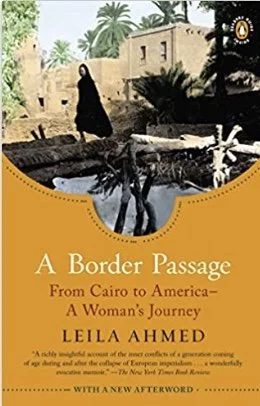A Border Passage by Leila Ahmed (Penguin)
“You’re an Arab! An Arab! And you don’t know your own language,” a teacher screamed at Leila Ahmed when she was twelve. “I am not an Arab,” she replied with equal fury, “I am Egyptian! And anyway we don’t speak like this!”
In 1952, the Egyptian Revolution that stripped the country of British colonialism brought with it shouts of “Arab nationalism! We the Arabs!” But Ahmed, born in 1940, is already shaped by the final days of the British Empire that had vouchsafed only partial independence to Egypt. She and her siblings have grown up speaking French and Egyptian Arabic but English is their preferred language. That’s what they speak at school and when they’re with their friends. Their father is a man with a “colonized consciousness” who had gone to university in Birmingham, “cherishing things European and undervaluing the very heritage that had shaped him.” He teaches his children to love Western classical music and to place it above the Arabic music that their mother, who is staunchly and thoroughly Egyptian, sings. Ahmed and her siblings begin to see Arabic as inferior, although it’s the language they use when they talk with their mother. This, Ahmed admits, “in some way marked her too, in some way silently, silently in my child’s mind, as inferior.” She realizes much later that this is one of “the hidden, uncounted costs of colonialism” that her mother pays, as her children speak a language she doesn’t understand and go away from her to be educated, and to make their lives, in distant countries.
Ahmed’s mother lives in a world of women, talking, drinking coffee and smoking cigarettes with her sisters and her friends. She teaches her children that the core of Islam is to hurt no one, to harm oneself before injuring someone else. “He who kills one being kills all of humanity, and he who revives, or gives life to, one being revives all of humanity.” She, and the women around her, have distilled their own “essence of Islam,” separate from the stern, fierce “orthodox interpretation” that’s the male version. They live in houses surrounded by gardens that are rich with trees and flowers, wrapped in desert silence, light, and shadow, a world of beauty. It’s one that Ahmed learns to disregard as “women’s culture,” gentle, generous, and powerless, in which “women bowed their heads and acquiesced” to the men “who did things.” “The only escape from this,” she tells herself, “ would be for me to become either a man or a Westerner.”
Ahmed grows up immersed in politics, living through a bloodless revolution that turned into a dictatorship and then through a war that prompted Ahmed’s British and Jewish friends to leave Cairo. Her father falls out favor with the government and Ahmed is long denied permission to leave Cairo for England, where she has been accepted at Cambridge. When she goes there at last, she has the label of “Arab” thrust upon her by English society and begins “puzzling out what it means to be Arab.”
“In Egypt,” she says, “I’d be just another Egyptian, whereas in the West it’s impossible for me to escape, forget this false constructed Arabness.” In a country whose colonization of her own has made her English in language and thought, Ahmed takes on an imposed identity that is foreign to her. Yet while she learns about being Arab, she sees more clearly what it is to be an Egyptian from Cairo, a city where, throughout its history “Islam, Christianity, Judaism, Morocco, Istanbul, Alexandria” were all blended into “its own unique Cairo brew.”
Discovering the beauty of Arab literature, written in a literary language that no one speaks, Ahmed recognizes the richness of oral culture, expressed in the “mother tongue” spoken by the women whom she once dismissed. Her journey is farther than from Cairo to an academic American life. Her struggle to achieve a wider knowledge of who she is and where she came from is long and painful, told through a memoir steeped in rigorous intellect that opens new worlds of thought to its readers. ~Janet Brown

